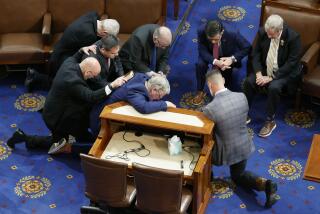Baptists Denounce Raid on Libya : Other Moderate, Liberal Protestant Leaders in Accord
- Share via
Polls show that the predominant American response to the U.S. bombing of Libya on April 14 was one of support for the Reagan Administration, but the reaction was different among officials of the American Baptist Churches gathered in Green Lake, Wis., for a conference on church growth.
About 60%, or 160 of them, signed a statement April 16 calling the strike against military targets “an inappropriate response to recent terrorist attacks and also an act of war against a sovereign nation.” They endorsed peaceful resolution of international conflicts, while predicting that the U.S. strategy will prove “ineffective.”
Nearly 200 Signatures
Eventually, nearly 200 conference participants signed the statement, said Ron Arena, a spokesman for the 1.3-million-member denomination. He said that since many withheld their signatures because the statement was not “pastoral” enough, the Rev. Robert C. Campbell, general secretary, sent to President Reagan a telegram moderate in tone but still “regretting his decision.”
The reaction by leaders of American Baptist Churches, a denomination with a conservative constituency that usually abhors controversy, illustrated the strong reaction of moderate to liberal Protestant leaders against the Libya strike--in contrast to broad approval or acquiescence from other segments of American society.
Little or nothing has been said publicly by evangelical denominations. “Member denominations of the National Assn. of Evangelicals are not to inclined to make public pronouncements,” said Robert P. Dugan, director of the organization’s Washington Office of Public Affairs.
But Dugan said that none of 120 evangelical ministers and lay persons involved in briefings with government officials this week suggested that the United States “took a low moral road” by bombing Libya. “We take no joy in the loss of human lives,” Dugan said, “but that attack was calculated to save lives in the long haul.”
Two Protestant denomination presidents called the bombing “both morally questionable and fundamentally imprudent” in a joint statement last week, while executives of the Presbyterian Church (USA) and Episcopal Church also leveled criticisms. The Rev. Arie Brouwer, general secretary of the National Council of Churches, said actions such as the Libya bombing “corrode the soul of America.”
Meanwhile, religious leaders who have joined with those Protestant bodies in opposing Reagan Administration foreign policies on South Africa, Central America and the nuclear arms race were undecided or of a different mind on this issue.
The raid was supported by top officials of Reform Judaism and the American Jewish Committee. Few Roman Catholic bishops issued statements on the action, and the best known of them who did issue a comment, Cardinal Joseph Bernardin of Chicago, said he considered the strike a “proportionate” response to Libyan-sponsored terrorism.
However, a new effort by ecumenical Protestant leaders to draw together voices of opposition within and outside of their own ranks was launched in New York City Friday. “An Appeal to Reason,” which also will be printed as a full-page advertisement next week in the New York Times and possibly other newspapers, declared that revenge is not the answer:
“The death of Kadafi’s 15-month-old daughter was as painful as the death of the baby blown from the TWA plane by a terrorist explosive. One death did not avenge the other. And the more we bomb, the more we are shaped by our actions into the very image of those we seek to destroy.”
Statement Co-Authored
The statement was co-authored by the Rev. William Sloan Coffin, the liberal activist pastor of New York’s Riverside Church, and the Rev. Joan Campbell, executive director of the U.S. office of the World Council of Churches.
Campbell acknowledged that the effort to buck public opinion is risky. “We are taking a position without really knowing if people are with us on this. But if the churches don’t say something, we are not being faithful to what we do,” she said in an interview by telephone.
Initial signers of “An Appeal to Reason” included playwright Arthur Miller, author Alice Walker and the Rev. M. Lorenzo Shephard, president of the Progressive National Baptist Convention. “We were able to get many black church leaders to sign,” Campbell said.
Waiting for Methodists
Bishops of the United Methodist Church, the largest of the ecumenical Protestant bodies, have generally been silent on the subject. But Tom McAnally, a Methodist spokesman based in Nashville, Tenn., said the bishops will probably address the issue next week in Morristown, N.J., where they are already scheduled to give final approval to a pastoral letter against the U.S. policy of nuclear deterrence.
Nevertheless, Bishop Jack M. Tuell of Los Angeles, in a brief statement to The Times, said, “While I understand the frustration of the Administration in dealing with the evil of terrorism, I do not believe that our raid on Libya will prove an effective way of combating terrorism; indeed, the history of humankind indicates that violent retaliation begets more violence.”
Evangelist Billy Graham, the most widely admired evangelical leader, said at a wide-ranging news conference Thursday in Washington that the U.S. bombing of Libya is “not going to stop terrorism,” but he refused to criticize President Reagan for ordering the air strike. “I suppose the President found himself between a rock and a hard place,” Graham said. Last week, in Detroit, Graham told reporters that the attack was “like throwing a rock at a hornet’s nest.”
More to Read
Sign up for Essential California
The most important California stories and recommendations in your inbox every morning.
You may occasionally receive promotional content from the Los Angeles Times.












